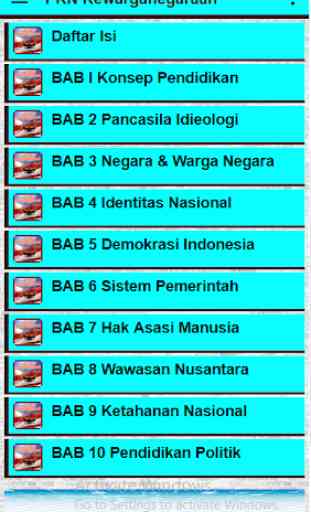Pendidikan Kewarganegaraan
Systematically discuss the scope of the problem of citizenship education, and among its contents discuss about Citizenship education
Civic Education is a subject that focuses on the formation of knowledge and attitudes towards students' personal and behavioral behavior. Students come from different backgrounds, both religious, socio-cultural, language, age, and ethnicity. It is intended that Indonesian citizens become smart, skilled, creative, and innovative and have a distinctive character as an Indonesian nation based on the values of Pancasila and the 1945 Constitution.
In the 1945 Constitution the provisions on National Education are regulated according to Article 31 paragraph 3 and paragraph 5. Paragraph 3 reads "The Government seeks and organizes a National Education system, which enhances faith and piety and noble character in order to educate the nation's life, which is regulated by Law " Paragraph 5 reads "The Government advances Science and Technology by upholding religious values and national unity for the advancement and welfare of humanity".
According to article 39 of Law No. 22 of 1999 concerning the National Education System in Cholisin (2001: 1) that "Citizenship Education is a subject that provides basic knowledge and capabilities of citizens' relations with the government to become citizens who can be relied on by the nation and state".
According to the Team of the Directorate General of Primary and Secondary Education Management (2006: 11), citizenship education is a field of scientific studies and educational programs in schools and is accepted as the main vehicle and the essence of democratic education in Indonesia carried out through:
1) Civic Intelligence That is the intelligence and reasoning power of citizens in both the spiritual, rational, emotional, and social dimensions.
2) Civic Responsibility That is the awareness of rights and obligations as responsible state citizens.
3) Civic Particiption That is the ability of participating citizens on the basis of their responsibilities, both individually, socially, and as leaders of the future. In the opinion of S. Sumarsono (2002: 6) "Citizenship Education is an effort to equip students with basic abilities with regard to relations between citizens and the state as well as preliminary education to defend the country, to become citizens who can be relied on by the nation and the Unitary State of the Republic of Indonesia "
Civic Education is a subject that focuses on the formation of knowledge and attitudes towards students' personal and behavioral behavior. Students come from different backgrounds, both religious, socio-cultural, language, age, and ethnicity. It is intended that Indonesian citizens become smart, skilled, creative, and innovative and have a distinctive character as an Indonesian nation based on the values of Pancasila and the 1945 Constitution.
In the 1945 Constitution the provisions on National Education are regulated according to Article 31 paragraph 3 and paragraph 5. Paragraph 3 reads "The Government seeks and organizes a National Education system, which enhances faith and piety and noble character in order to educate the nation's life, which is regulated by Law " Paragraph 5 reads "The Government advances Science and Technology by upholding religious values and national unity for the advancement and welfare of humanity".
According to article 39 of Law No. 22 of 1999 concerning the National Education System in Cholisin (2001: 1) that "Citizenship Education is a subject that provides basic knowledge and capabilities of citizens' relations with the government to become citizens who can be relied on by the nation and state".
According to the Team of the Directorate General of Primary and Secondary Education Management (2006: 11), citizenship education is a field of scientific studies and educational programs in schools and is accepted as the main vehicle and the essence of democratic education in Indonesia carried out through:
1) Civic Intelligence That is the intelligence and reasoning power of citizens in both the spiritual, rational, emotional, and social dimensions.
2) Civic Responsibility That is the awareness of rights and obligations as responsible state citizens.
3) Civic Particiption That is the ability of participating citizens on the basis of their responsibilities, both individually, socially, and as leaders of the future. In the opinion of S. Sumarsono (2002: 6) "Citizenship Education is an effort to equip students with basic abilities with regard to relations between citizens and the state as well as preliminary education to defend the country, to become citizens who can be relied on by the nation and the Unitary State of the Republic of Indonesia "
Category : Books & Reference

Related searches




